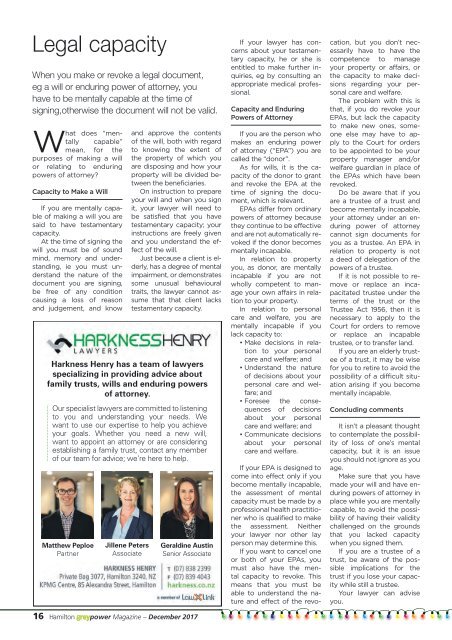Hamilton Grey Power December 2017
The Hamilton Grey Power Magazine is a localised edition of the National Grey Power Magazine, reporting on the policies of the Grey Power Federation, concerns of the elderly and reader interest articles which keep the members informed on issues that directly effect them.
The Hamilton Grey Power Magazine is a localised edition of the National Grey Power Magazine, reporting on the policies of the Grey Power Federation, concerns of the elderly and reader interest articles which keep the members informed on issues that directly effect them.
Create successful ePaper yourself
Turn your PDF publications into a flip-book with our unique Google optimized e-Paper software.
Legal capacity<br />
When you make or revoke a legal document,<br />
eg a will or enduring power of attorney, you<br />
have to be mentally capable at the time of<br />
signing,otherwise the document will not be valid.<br />
What does “mentally<br />
capable”<br />
mean, for the<br />
purposes of making a will<br />
or relating to enduring<br />
powers of attorney?<br />
Capacity to Make a Will<br />
If you are mentally capable<br />
of making a will you are<br />
said to have testamentary<br />
capacity.<br />
At the time of signing the<br />
will you must be of sound<br />
mind, memory and understanding,<br />
ie you must understand<br />
the nature of the<br />
document you are signing,<br />
be free of any condition<br />
causing a loss of reason<br />
and judgement, and know<br />
and approve the contents<br />
of the will, both with regard<br />
to knowing the extent of<br />
the property of which you<br />
are disposing and how your<br />
property will be divided between<br />
the beneficiaries.<br />
On instruction to prepare<br />
your will and when you sign<br />
it, your lawyer will need to<br />
be satisfied that you have<br />
testamentary capacity; your<br />
instructions are freely given<br />
and you understand the effect<br />
of the will.<br />
Just because a client is elderly,<br />
has a degree of mental<br />
impairment, or demonstrates<br />
some unusual behavioural<br />
traits, the lawyer cannot assume<br />
that that client lacks<br />
testamentary capacity.<br />
Harkness Henry has a team of lawyers<br />
specializing in providing advice about<br />
family trusts, wills and enduring powers<br />
of attorney.<br />
Our specialist lawyers are committed to listening<br />
to you and understanding your needs. We<br />
want to use our expertise to help you achieve<br />
your goals. Whether you need a new will,<br />
want to appoint an attorney or are considering<br />
establishing a family trust, contact any member<br />
of our team for advice; we’re here to help.<br />
Matthew Peploe<br />
Partner<br />
Jillene Peters<br />
Associate<br />
Geraldine Austin<br />
Senior Associate<br />
16 <strong>Hamilton</strong> greypower Magazine – <strong>December</strong> <strong>2017</strong><br />
If your lawyer has concerns<br />
about your testamentary<br />
capacity, he or she is<br />
entitled to make further inquiries,<br />
eg by consulting an<br />
appropriate medical professional.<br />
Capacity and Enduring<br />
<strong>Power</strong>s of Attorney<br />
If you are the person who<br />
makes an enduring power<br />
of attorney (“EPA”) you are<br />
called the “donor”.<br />
As for wills, it is the capacity<br />
of the donor to grant<br />
and revoke the EPA at the<br />
time of signing the document,<br />
which is relevant.<br />
EPAs differ from ordinary<br />
powers of attorney because<br />
they continue to be effective<br />
and are not automatically revoked<br />
if the donor becomes<br />
mentally incapable.<br />
In relation to property<br />
you, as donor, are mentally<br />
incapable if you are not<br />
wholly competent to manage<br />
your own affairs in relation<br />
to your property.<br />
In relation to personal<br />
care and welfare, you are<br />
mentally incapable if you<br />
lack capacity to:<br />
• Make decisions in relation<br />
to your personal<br />
care and welfare; and<br />
• Understand the nature<br />
of decisions about your<br />
personal care and welfare;<br />
and<br />
• Foresee the consequences<br />
of decisions<br />
about your personal<br />
care and welfare; and<br />
• Communicate decisions<br />
about your personal<br />
care and welfare.<br />
If your EPA is designed to<br />
come into effect only if you<br />
become mentally incapable,<br />
the assessment of mental<br />
capacity must be made by a<br />
professional health practitioner<br />
who is qualified to make<br />
the assessment. Neither<br />
your lawyer nor other lay<br />
person may determine this.<br />
If you want to cancel one<br />
or both of your EPAs, you<br />
must also have the mental<br />
capacity to revoke. This<br />
means that you must be<br />
able to understand the nature<br />
and effect of the revocation,<br />
but you don’t necessarily<br />
have to have the<br />
competence to manage<br />
your property or affairs, or<br />
the capacity to make decisions<br />
regarding your personal<br />
care and welfare.<br />
The problem with this is<br />
that, if you do revoke your<br />
EPAs, but lack the capacity<br />
to make new ones, someone<br />
else may have to apply<br />
to the Court for orders<br />
to be appointed to be your<br />
property manager and/or<br />
welfare guardian in place of<br />
the EPAs which have been<br />
revoked.<br />
Do be aware that if you<br />
are a trustee of a trust and<br />
become mentally incapable,<br />
your attorney under an enduring<br />
power of attorney<br />
cannot sign documents for<br />
you as a trustee. An EPA in<br />
relation to property is not<br />
a deed of delegation of the<br />
powers of a trustee.<br />
If it is not possible to remove<br />
or replace an incapacitated<br />
trustee under the<br />
terms of the trust or the<br />
Trustee Act 1956, then it is<br />
necessary to apply to the<br />
Court for orders to remove<br />
or replace an incapable<br />
trustee, or to transfer land.<br />
If you are an elderly trustee<br />
of a trust, it may be wise<br />
for you to retire to avoid the<br />
possibility of a difficult situation<br />
arising if you become<br />
mentally incapable.<br />
Concluding comments<br />
It isn’t a pleasant thought<br />
to contemplate the possibility<br />
of loss of one’s mental<br />
capacity, but it is an issue<br />
you should not ignore as you<br />
age.<br />
Make sure that you have<br />
made your will and have enduring<br />
powers of attorney in<br />
place while you are mentally<br />
capable, to avoid the possibility<br />
of having their validity<br />
challenged on the grounds<br />
that you lacked capacity<br />
when you signed them.<br />
If you are a trustee of a<br />
trust, be aware of the possible<br />
implications for the<br />
trust if you lose your capacity<br />
while still a trustee.<br />
Your lawyer can advise<br />
you.


















